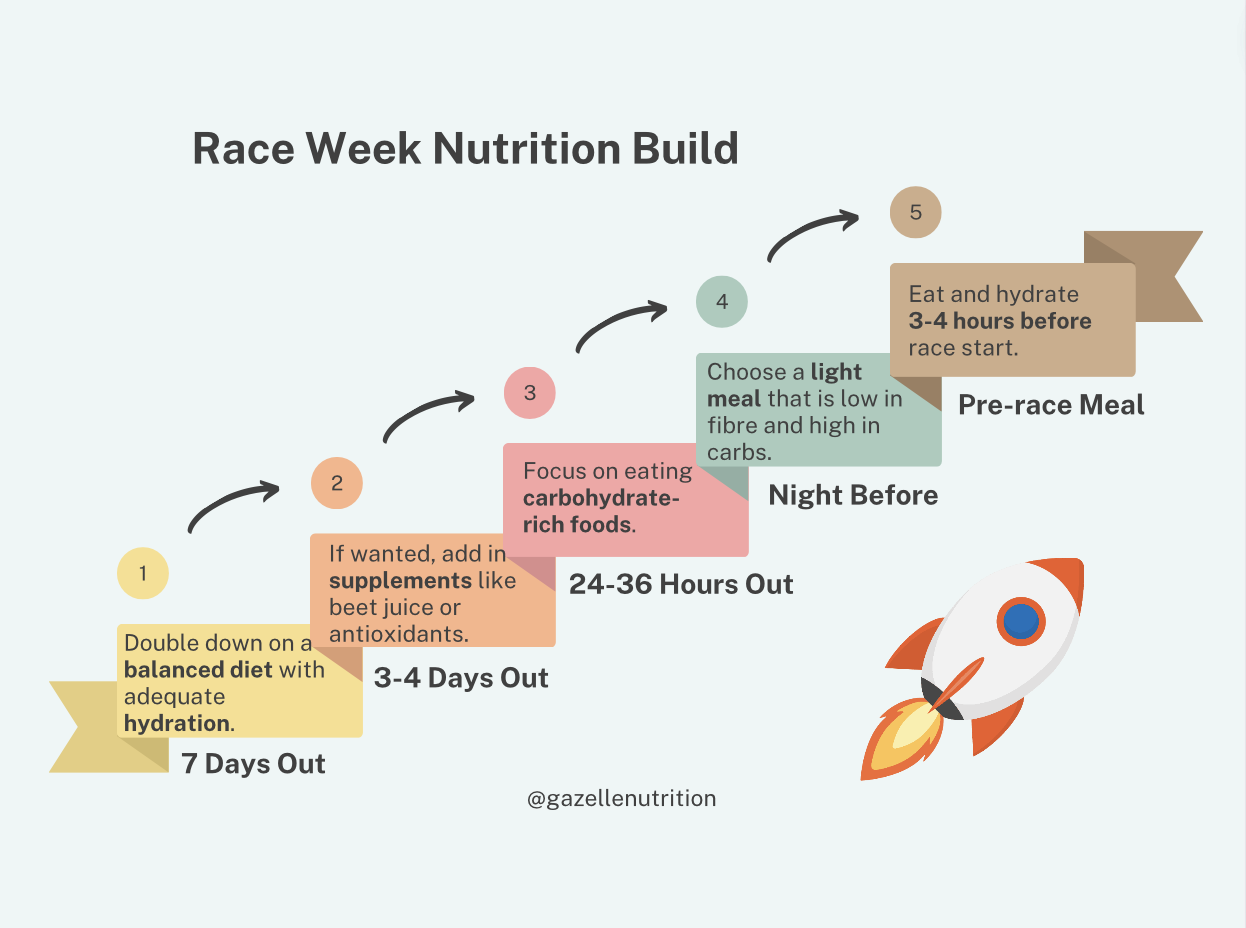Loading Carbs for Race Day
Steps to follow during race week to build nutrition and carb load for a productive race day
Carbohydrate loading is a strategy athletes use to maximize their energy stores leading up to endurance events lasting longer than 90 minutes. This nutrition technique involves manipulating the amount of carbohydrates you eat to optimize the glycogen you store in your muscles and liver. Glycogen is the body’s storage form of carbohydrates. By saturating your glycogen stores, you can enhance your endurance, delay the onset of fatigue, and optimize your performance during your event. After all, carbohydrates are your primary fuel source for long efforts. Countdown to race day with these valuable race week carb-boosting nutrition tips.
7 Days
One week from race day, it is time to switch to a moderate to high carbohydrate diet if you usually eat low carb. If you follow a typical endurance athlete’s high-carb diet, continue with your usual way of eating. To get an extra edge this week, double down on healthy choices. Veggies, fruit, and whole grains are loaded with immune-supporting nutrients. It is not uncommon for athletes to pick up a sickness like an upper respiratory tract infection in the days leading up to competition. Support your wellness by choosing wholesome foods and practicing good lifestyle choices like getting enough sleep.
24-36 Hours
The actual carb loading starts in the 1-2 days before competition. During this time, focus on choosing carbohydrate-laden foods like rice, pasta, bread, grains, fruit and dairy or dairy alternatives. For those who do not have diabetes, I often suggest adding sweet foods like sports drinks, juice, regular soda and even candies to bolster your carb count. Overall, choose foods that are low-fat, low-fibre, and low-spice.
To put these suggestions into practice:
Try and eat every 2-3 hours.
When plating your food, fill half your plate with starchy choices and a quarter with lean protein-rich foods.
Limit veggies and eat your biggest meal at midday to help with stomach comfort the next day when you race.
Stay well-hydrated by drinking water and electrolyte-rich beverages, but avoid overhydration.
Aim for straw-coloured urine; if it is clear, you are drinking too much, and if it is dark, you are drinking too little.
For those who like numbers, research recommends that endurance athletes aim to eat 8-12 g/kg of carbohydrate in the 1-2 days before competition. This amounts to 550-820 g for a 68 kg (150 lb) person. By prioritizing a balanced and carb-heavy diet during this critical window, you can be sure that your body is armed for optimal performance for your event.
Race Day
On race day, you should focus on consuming easily digestible foods that are energy-packed and will not cause gastrointestinal discomfort. Begin your day with a light breakfast, ideally 2-4 hours before the start. Opt for a meal rich in carbohydrates, like a banana, bagel and peanut butter, that will provide a steady energy source. Or, choose Eliud Kipchoge’s favourite, oatmeal, to get that speedy fuel boost. Finally, top up your stores by having a light snack 2 hours from the start and then another at the start line. Remember to hydrate, but back off on the liquids an hour or two before the start to minimize your need to use the bathroom.
Does Carb Loading Work?
Studies suggest proper carbohydrate loading and provision during a race can translate into a 2-3% performance improvement. In a long race, this is HUGE! Carb loading is a simple and effective way to maximize race day performance.
Interesting Note
A 2018 study in Medicine and Science in Sports and Exercise found that combining creatine and carbohydrate loading improved power output in the closing sprints in a 100 km cycling time trial. Creatine may be a beneficial adjunct to carbohydrate loading and enhance performance in the later stages of endurance events.
Article written by: Ashley Leone, RD
Ready to take your performance to the next level with personalized sports nutrition? Book an appointment with Ashley, an expert Sports Dietitian who’s helped hundreds of athletes and active individuals fuel smarter and train stronger.




